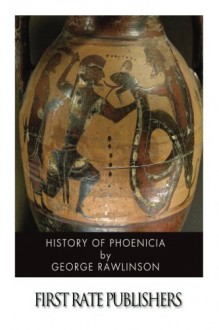Rawlinson's comprehensive history of the Phoenician Empire is a must read for anyone interested in antiquity. From the preface: "Histories of Phoenicia or of the Phoenicians were written towards the middle of the present century by Movers and Kenrick. The elaborate work of the former writer01...
show more
Rawlinson's comprehensive history of the Phoenician Empire is a must read for anyone interested in antiquity. From the preface: "Histories of Phoenicia or of the Phoenicians were written towards the middle of the present century by Movers and Kenrick. The elaborate work of the former writer01 collected into five moderate-sized volumes all the notices that classical antiquity had preserved of the Religion, History, Commerce, Art, &c., of this celebrated and interesting nation. Kenrick, making a free use of the stores of knowledge thus accumulated, added to them much information derived from modern research, and was content to give to the world in a single volume of small size,02 very scantily illustrated, the ascertained results of criticism and inquiry on the subject of the Phoenicians up to his own day. Forty-four years have since elapsed; and in the course of them large additions have been made to certain branches of the inquiry, while others have remained very much as they were before. Travellers, like Robinson, Walpole, Tristram, Renan, and Lortet, have thrown great additional light on the geography, geology, fauna, and flora of the country. Excavators, like Renan and the two Di Cesnolas, have caused the soil to yield up most valuable remains bearing upon the architecture, the art, the industrial pursuits, and the manners and customs of the people. Antiquaries, like M. Clermont-Ganneau and MM. Perrot and Chipiez, have subjected the remains to careful examination and criticism, and have definitively fixed the character of Phoenician Art, and its position in the history of artistic effort. Researches are still being carried on, both in Phoenicia Proper and in the Phoenician dependency of Cyprus, which are likely still further to enlarge our knowledge with respect to Phoenician Art and Archæology; but it is not probable that they will affect seriously the verdict already delivered by competent judges on those subjects. The time therefore appeared to the author to have come when, after nearly half a century of silence, the history of the people might appropriately be rewritten. The subject had long engaged his thoughts, closely connected as it is with the histories of Egypt, and of the "Great Oriental Monarchies," which for thirty years have been to him special objects of study; and a work embodying the chief results of the recent investigations seemed to him a not unsuitable termination to the historical efforts which his resignation of the Professorship of Ancient History at Oxford, and his entrance upon a new sphere of labour, bring naturally to an end."
show less

